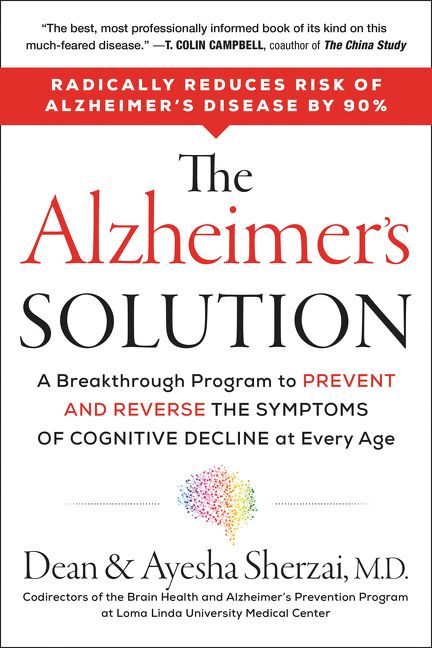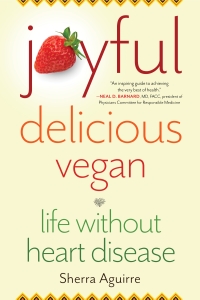Book Review of The Alzheimer's Solution: A Breakthrough Program to Prevent and Reverse the Symptoms of Cognitive Decline at Every Age
The Drs. Sherzai, a husband and wife team, watched their grandfathers develop this disease as they grew older. They understood first hand the heartbreak of seeing a loved one unable to remember close family members, or forget how to walk, turn over in bed or swallow food. This fueled their passion for neurology as their chosen field, but ultimately they became frustrated because there is no pharmaceutical prevention or cure. There are drugs that may help symptoms for a limited period of time, but symptoms often return and there is no cure despite the many billions of dollars spent on research.
 The good news is that a growing body of scientific evidence and research indicates the risk of developing Alzheimer’s, just like diabetes and heart disease, can be decreased significantly by eating a plant-based diet low in fat and sugar, staying physically active, managing stress and getting enough sleep. A 1993 study at Loma Linda of 3000 people found that those who ate meat – including people who only ate chicken and fish – had twice the risk of developing dementia compared with vegetarians. And with Alzheimer’s, heart disease and diabetes, diet and lifestyle factors are more important than family history and genetic factors. In fact they can act to “turn off” genes associated with the disease. Other behaviors that counteract Alzheimer's development are staying engaged with family and friends, and having a sense of connection and purpose, especially later in life.
The good news is that a growing body of scientific evidence and research indicates the risk of developing Alzheimer’s, just like diabetes and heart disease, can be decreased significantly by eating a plant-based diet low in fat and sugar, staying physically active, managing stress and getting enough sleep. A 1993 study at Loma Linda of 3000 people found that those who ate meat – including people who only ate chicken and fish – had twice the risk of developing dementia compared with vegetarians. And with Alzheimer’s, heart disease and diabetes, diet and lifestyle factors are more important than family history and genetic factors. In fact they can act to “turn off” genes associated with the disease. Other behaviors that counteract Alzheimer's development are staying engaged with family and friends, and having a sense of connection and purpose, especially later in life.
Drs. Dean and Ayesha Sherzai have developed a program they call NEURO for anyone who wants to avoid this feared disease or reverse early symptoms. At the Loma Linda University Medical Center they successfully reverse early symptoms and even restore mental function to these patients, with personalized nutritional and lifestyle plans, ongoing support and follow up. The basics of the NEURO plan are:
• Nutrition – eating a whole plant based diet low in fat and sugar and avoiding processed foods.
• Exercise – active lifestyle that incorporates movement at varying times during the day, not just a stop at the gym after sitting all day.
• Unwind – managing stress with breathing exercises, spending time in nature, socializing, meditation, yoga etc.
This groundbreaking book includes a questionnaire that can be completed in minutes to assess your risk. There is a guide for choosing, making and sustaining changes that fit your lifestyle, preferences and interests to minimize your risk, as well as advice on finding or developing a support system. The good news is that genes are not destiny and the answer to preventing Alzheimer’s and other dementias as we age starts in our refrigerators!
 The good news is that a growing body of scientific evidence and research indicates the risk of developing Alzheimer’s, just like diabetes and heart disease, can be decreased significantly by eating a plant-based diet low in fat and sugar, staying physically active, managing stress and getting enough sleep. A 1993 study at Loma Linda of 3000 people found that those who ate meat – including people who only ate chicken and fish – had twice the risk of developing dementia compared with vegetarians. And with Alzheimer’s, heart disease and diabetes, diet and lifestyle factors are more important than family history and genetic factors. In fact they can act to “turn off” genes associated with the disease. Other behaviors that counteract Alzheimer's development are staying engaged with family and friends, and having a sense of connection and purpose, especially later in life.
The good news is that a growing body of scientific evidence and research indicates the risk of developing Alzheimer’s, just like diabetes and heart disease, can be decreased significantly by eating a plant-based diet low in fat and sugar, staying physically active, managing stress and getting enough sleep. A 1993 study at Loma Linda of 3000 people found that those who ate meat – including people who only ate chicken and fish – had twice the risk of developing dementia compared with vegetarians. And with Alzheimer’s, heart disease and diabetes, diet and lifestyle factors are more important than family history and genetic factors. In fact they can act to “turn off” genes associated with the disease. Other behaviors that counteract Alzheimer's development are staying engaged with family and friends, and having a sense of connection and purpose, especially later in life.Drs. Dean and Ayesha Sherzai have developed a program they call NEURO for anyone who wants to avoid this feared disease or reverse early symptoms. At the Loma Linda University Medical Center they successfully reverse early symptoms and even restore mental function to these patients, with personalized nutritional and lifestyle plans, ongoing support and follow up. The basics of the NEURO plan are:
• Nutrition – eating a whole plant based diet low in fat and sugar and avoiding processed foods.
• Exercise – active lifestyle that incorporates movement at varying times during the day, not just a stop at the gym after sitting all day.
• Unwind – managing stress with breathing exercises, spending time in nature, socializing, meditation, yoga etc.
• Restore – 7-8 hours of quality sleep on a regular basis to detoxify; management of medications or food that adversely affect sleep; treatment for sleep disorders.
• Optimize – activity that engages and challenges different parts of the brain, e.g. music, and meaningful social interaction.This groundbreaking book includes a questionnaire that can be completed in minutes to assess your risk. There is a guide for choosing, making and sustaining changes that fit your lifestyle, preferences and interests to minimize your risk, as well as advice on finding or developing a support system. The good news is that genes are not destiny and the answer to preventing Alzheimer’s and other dementias as we age starts in our refrigerators!


